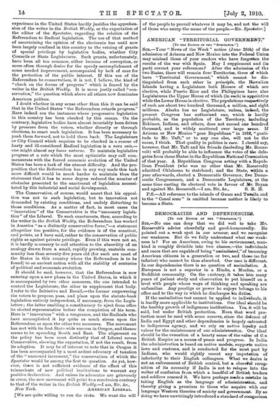AMERICAN "TERRITORIAL GOVERNMENT."
[To THE EDITOR OP TRY " SPROTATOR.1 13114—Your " News of the Week " notice (June 25th) of the admission of Arizona and New Mexico into the Federal Union may mislead those of your readers who have forgotten the results of the war with Spain. May I supplement and (in part) correct your references P After the admission of the two States, there will remain four Territories, three of which have " Territorial Government," which cannot be dis- tinguished from each other in principle, the Hawaiian Islands having a Legislature both Houses of which are elective, while Puerto Rico and the Philippines have also Legislatures the Upper House of which (in each) is appointive while the Lower House is elective. The populations reepeotively of each are about two hundred thousand, a million, and eight millions. Alaska has no Legislature, unless, indeed, the present Congress has authorised one, which is hardly probable, as the population of the Territory, including Eskimos, Indians, and others, does not exceed one hundred thousand, and is widely scattered over large areas. If Arizona or New Mexico " goes Republican " in 191e„ " grati- tude to Mr. Taft," or to any one else, will not be the cause, I think. That quality in politics is rare. I should say, however, that Mr. Taft and his friends (inelnding Mr. Roose- velt) will probably be able to influence the votes of the dele- gates from those States in the Republican National Convention of that year. A Republican Congress acting with a Repub- lican President (who was no other than Mr. Roosevelt) admitted Oklahoma to statehood; and the State, within a year afterwards, elected a Democratic Governor, five Demo- cratic Congressmen, and a Democratic Legislature, at the same time casting its electoral vote in favour of Mr. Bryan
and against Mr. Roosevelt.—I am, Sir, &c., S. R. H. P.S.—All reference to the islands of Guam and Tutuila and to the " Canal zone " is omitted because neither is likely to become a State.


















































 Previous page
Previous page